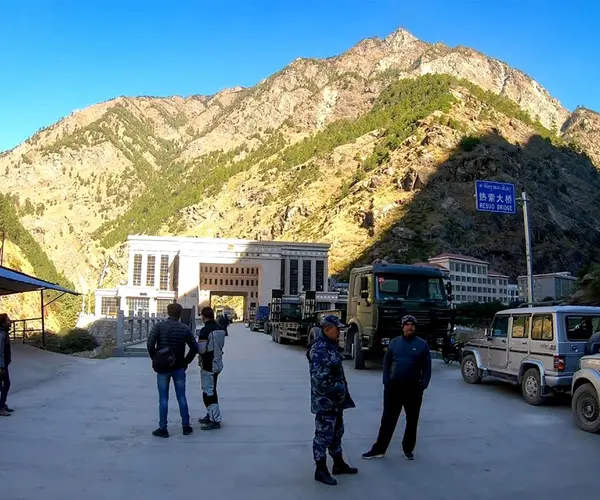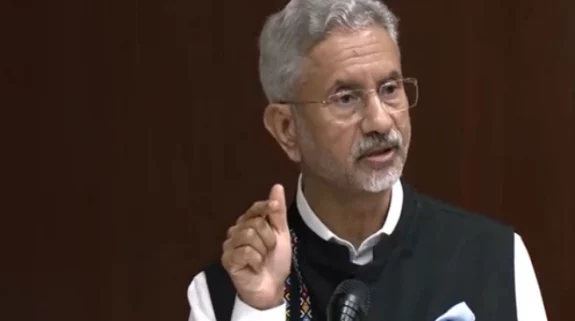Nepali businessmen dealing with China have incurred huge losses after China once again closed two key border crossing points for bilateral trade between the two countries, citing sudden rise in the number of coronavirus infections in the bordering Tibetan Autonomous Region (TAR).
Officials say that Tatopani-Zhangmu and Rasuwagadhi-Kerung border points have been closed by China for the past one week owing to the growing number of coronavirus infections in Tibet. Nepal's overland trade with China mainly takes place though these two border points.
Nepal imported goods worth Nepali rupees 233.9 billion while the export of goods was valued at just Rs1 billion in the year 2021. China has remained Nepal's second largest trading partner after India.
Recently, China has been miffed by Nepal, which has shown reluctance to accept projects under Beijing’s flagship Belt and Road Initiative (BRI). In view of the situation in Pakistan and Sri Lanka, Nepal wants to avoid falling into a “debt trap,” by taking huge loans offered under BRI. Kathmandu has already informed Beijing that it is interested only in grants and not loans from China.
Ram Prasad Mainali, a chief customs officer at Rasuwagadhi Customs Office, said that the Chinese side closed the border a week ago without prior notice to the Nepali side.
"Not a single container truck has been allowed to enter Nepal from the bordering Kerung town for the past one week. We have been unofficially told by the Chinese side that the rising number of coronavirus cases forced them to close border points," Mainali told India Narrative over phone on Sunday evening.
On an average, per day 14 container trucks loaded with goods would come to Nepal from China through Rasuwagadhi-Kerung border points before the border closure, according to Mainali.
As major Hindu festivals Teej and Dashain are inching closer, Nepali traders have already placed their orders in China.
Nepal, China pen transit trade treaty, nine other pacts – https://t.co/oFlD5zqmpa #THTPrint pic.twitter.com/GHrl1l0FjD
— The Himalayan Times (@thehimalayan) March 22, 2016
Nepal receives most of the goods targeted for the festive season through Tatopani-Zhangmu and Rasuwagadhi-Kerung border points with China.
At least 50 Nepal-bound container trucks are presently stuck in Tibet after the Chinese side enforced a week-long lockdown owing to the COVID-19 pandemic, media reports said.
According to Dharma Poudel, a Nepali businessman, who is engaged in cross-border trade, said that the container trucks loaded with goods have been stranded in Tibet since the Chinese side closed the border owing to the pandemic.
Narad Gautam, chief of Tatopani-Zhangmu border crossing between Nepal and China, said that the Chinese side has not shared anything about how long the border point will remain shut. "On an average, per day only eight container trucks loaded with goods would enter Nepal via this border point. Now, the border point is completely closed for trade," Gautam said.
Last time, China reopened the Tatopati-Zhangmu trade point in March 2020 amid the pandemic. But that did not last long. China closed the border point immediately owing to the growing number of COVID-19 infections in Nepal.
Some container trucks loaded with goods have been rerouted through Kolkata city of India's West Bengal via sea after China recently closed the major trade points, according to Nepali traders.
It takes at least 35 days for the rerouted containers to arrive in Kathmandu via Kolkata while it takes only 15 days from the overland route.
"If we reroute our container trucks via Kolkata it substantially increases the cost," said Ashok Shrestha, another Nepali trader doing business with China.
A senior Nepali official at the Ministry of Foreign Affairs said that they are constantly in touch with the Chinese side to find out ways to resume at least one-way trade via Chinese border points.
"The Chinese side has conveyed us that they would be able to resume two-way trade once the coronavirus comes under control in Tibet," the official told India Narrative.
In a meeting between Nepali foreign minister Narayan Khadka and his Chinese counterpart Wang Yi in Qingdao city of China last week, the two sides discussed cross-border trade despite geographical difficulties and pandemic.
"The two foreign ministers decided to establish a joint mechanism for pandemic control in border ports. They also agreed to open Rasuwagadhi-Kerung and Tatopani-Zhangmu ports for two-way trade and Hilsa-Purang port for one way trade which will take place as soon as the fresh wave of COVID-19 pandemic in Tibet Autonomous Region of China is controlled," read a statement issued by the Nepali side after the meeting.
Nepal, China to jointly inspect closed Tatopani-Zhangmu border point https://t.co/onZgsC4OW6 pic.twitter.com/JvB5YlGyPn
— Oreng (@Oreng_Social) July 7, 2018
Nepal shares 1,414 km border with China's Tibet region. This is not the first time China is closing its border points with Nepal. In the wake of 2015 devastating earthquakes, China closed its border for two years. The border point came into full operation in March 2017. However, with the beginning of the pandemic in 2019, China enforced various restrictions along border points, which resulted in the limited trade between the two countries.
Also Read: Is China forcing Nepal to accept projects under BRI?




















